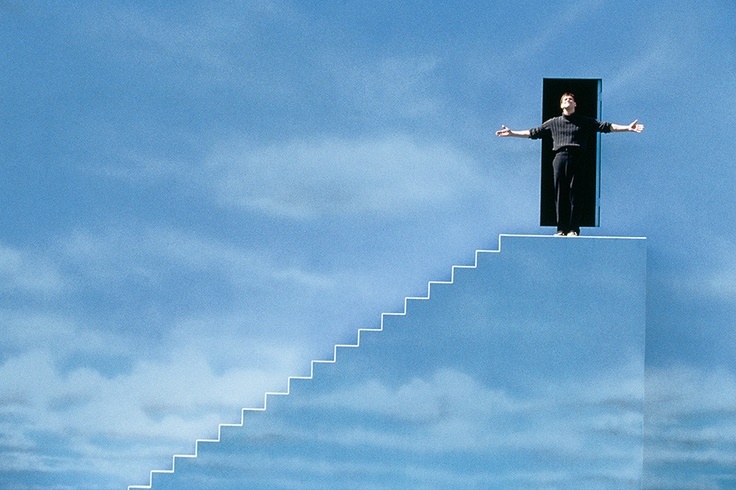|
by Smita Ganguli I've always thought it was interesting to see The Truman Show as a take on enforcing cultural norms. Truman wants to break free of the norms that he's been socialized with, with the idea that he merely 'wants to leave town,' not so radical, really. But it's different! And radical enough to be comically symbolic. Everyone goes out of their way to prevent this from happening because allowing Truman to act outside of "normal" behaviour means that they have to confront or see those norms in a different way themselves (and lose their jobs). Those surrounding Truman fear the uncertainty inherent in their lives having to change and work to stop him. That they're being paid to enforce the norms even further drills this point in.
The fear and uncertainty the actors feel about losing their jobs is symbolic of how we all feel some level of fear and uncertainty when our worldviews and socialization are challenged. My position is that, the film is, in a way, confronting us about how expository shows and media are. We always want more, no matter how it finishes. We become more involved in the fiction presented (even if it's 'reality'), to the point that we ignore our true lives. There's even a scene after the show ends where the security guard goes, "What else is on?" And that's OUR exact reaction when Truman leaves - we want more, we don't stop to reflect what happened, we just let our emotions of hunger for entertainment run wild. Not to mention it's a film about escaping, not about freedom. A film about Truman on the outside would be about freedom and it would be an entire film unto itself with different themes and ideas all to itself. It wouldn't work within this film. Going back to the whole idea of the movie being very manipulative, I also have an overwhelming desire to see what happens next. I want to see what Truman's life is like, out in the real world where he isn't being scripted and forced into life solely for the entertainment of others. Of course, this is entirely ironic, because although I'm cheering for Truman to overcome his situation and be free, I still want to have his every move put up on the screen for my enjoyment. It can be rather startling as a viewer to realize that we've been sucked up into the twisted minds of the directors and producers of this show, and are just feeding off what they give us, much like Truman did. Throughout the film we are cheering Truman on, by his side the whole time, rooting for him to escape his world. He is the star, and because we are rooting for him throughout we momentarily forget that his very predicament is our entertainment. We are totally drawn in to 'The Truman Show.' It captures us just as well as it does the audience in the movie. Our being manipulated becomes very clear when we see, in certain scenes, the orchestrators of the show choosing out shots, and, importantly, choosing the heartfelt music of the scenes in the television show. This is when we are forced into temporary self-awareness. During such scenes we judge the orchestrators and directors of the show harshly, condemning them for their immorality and their manipulation - angry that the audience of the world is feeding into the show. However, hypocritically, we realize that we were and are being manipulated. Every time heartfelt music comes on, every time we root for Truman in his struggle, we are feeding in to the manipulation of the orchestrators of the show. We are no more clever or conscious than the audience in the film. Every moving scene, every moment of sympathy for Truman, is being constructed by the men and women behind the scenes. And as we cheer him on throughout the entire film, we allow ourselves to become the unconscious, thoroughly-manipulated audience. There is something paradoxical about our experience as the viewer. With all that said, I want to avoid making any large, daring metaphorical conclusions yet, partly because I haven't thought about it enough and partly because I'd like to hear what you all have to say. But I do think that the idea of "we as the audience" definitely holds a mirror up to us, in society, forcing us to consider the way in which we consume entertainment and are constantly manipulated by it. The advertisements, the emotional responses to heartfelt music and shots, the indulgence in something only possible by means of blatant immorality and invasion of privacy - all things which we, while condemning consciously, eat up subconsciously. The idea of humanity 'preferring the cage' (the 'cage' meaning both the literal, physical and artificial world of Truman, as well as the state of blissful ignorance in which he lives) is also a prevalent idea. We are forced to consider whether or not we truly desire the cold, hard reality over a potentially safer, more bearable falsity. Here The Truman Show gives us a bit of hope, or at least encouragement, in Truman's escape (of escapism). The film ends with - after 'The Truman Show' coming to a finale after 30 years - two men who have been watching intently all along turning to each other and saying, "Ehh, what else is on?" Though Truman has chosen to confront reality, the world continues to indulge in mindless entertainment. It may be a bit of a stretch, but perhaps The Truman Show is calling us to say 'no' to our comfortable escapism in mindless indulgence and entertainment, daring us to boldly march through the pitch-black doorway into the world.
Follow us on Facebook and Instagram to be notified whenever we release new articles.
Do you use an RSS reader? Even better!
0 Comments
Leave a Reply. |
Categories
All
Archives
December 2022
|

 RSS Feed
RSS Feed
